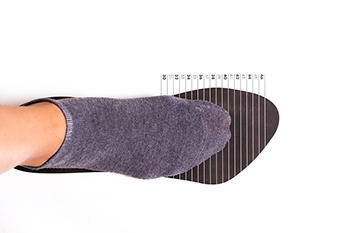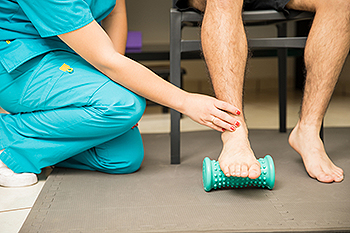Connect With Us
Blog
Items filtered by date: February 2024
The Significance of Wearing Properly Fitted Shoes for Work

Selecting the right footwear for work is not merely a matter of style but also a critical aspect of occupational health and safety. Wearing properly fitted shoes can significantly impact overall comfort, productivity, and well-being throughout the workday. Ill-fitting shoes can lead to a myriad of problems, including blisters, corns, calluses, and ingrown toenails. Additionally, shoes that are too tight or narrow may cause foot pain, discomfort, and even contribute to the development of long-term foot conditions such as bunions or hammertoes. Conversely, shoes that are too loose can result in instability, increased risk of falls, and potential injury. Properly fitted shoes provide adequate support, cushioning, and alignment for the feet, helping to alleviate strain and pressure on the muscles and joints. Whether standing for extended periods or engaging in physical activities, wearing shoes that fit properly is essential for maintaining optimal foot health and minimizing the risk of workplace-related injuries. If you would like more information about choosing shoes that fit correctly for your work day, it is suggested that you confer with a podiatrist.
Finding a properly-fitting shoe is important in reducing injuries and preventing foot problems. For more information about treatment, contact one of our podiatrists from Foot and Ankle Center. Our doctors will treat your foot and ankle needs.
Proper Shoe Fitting
A common concern when it comes to foot health, having properly fitted shoes can help prevent injuries to the foot. Out feet affect our posture and gait, which in turn affects the biomechanics and overall bodily structure. With 33 joints, 26 bones, and over 100 ligaments, the potential for serious injury is much greater than one realizes. Although the feet cease growth in adulthood, they still change shape as they mature. Here are some factors to consider when it comes to investing in proper fitting shoes:
- Be sure the shoes fit correctly right away
- Ensure the ball of your foot fits comfortably in the widest portion of the shoes
- Even though they may look fashionable, improper fitting shoes can either create adverse conditions or exacerbate existing ones you may already have
- Walk along a carpeted surface to ensure the shoes comfortably fit during normal activity
Keeping in mind how shoes fit the biomechanics of your body, properly-fitting shoes are vitally important. Fortunately, it is not difficult to acquire footwear that fits correctly. Be sure to wear shoes that support the overall structure of your body. Do your feet a favor and invest in several pairs of well-fitted shoes today.
If you have any questions please feel free to contact our office located in Egg Harbor Township, NJ . We offer the newest diagnostic and treatment technologies for all your foot and ankle needs.
Facts About Extensor Tendonitis

Extensor tendonitis, characterized by inflammation of the tendons in the feet, often arises from overuse or repetitive strain. These tendons, situated just beneath the skin, lack substantial protection which makes them susceptible to injury. In the feet, extensor tendonitis commonly stems from prolonged standing or wearing improperly fitting shoes. Symptoms typically include localized pain, swelling, and stiffness, often accompanied by difficulty with movement. Diagnosis by a podiatrist generally involves a physical examination and may require imaging tests to assess the extent of the damage. While surgery is rarely necessary, it may be considered for severe or persistent cases. Overall, early intervention and proper management can help alleviate symptoms of extensor tendonitis and promote full recovery, enabling you to resume your daily activities without discomfort. If you are experiencing symptoms of extensor tendonitis, it is suggested that you schedule an appointment with a podiatrist for an exam, diagnosis, and treatment options.
Foot Pain
Foot pain can be extremely painful and debilitating. If you have a foot pain, consult with one of our podiatrists from Foot and Ankle Center. Our doctors will assess your condition and provide you with quality foot and ankle treatment.
Causes
Foot pain is a very broad condition that could be caused by one or more ailments. The most common include:
- Bunions
- Hammertoes
- Plantar Fasciitis
- Bone Spurs
- Corns
- Tarsal Tunnel Syndrome
- Ingrown Toenails
- Arthritis (such as Gout, Rheumatoid, and Osteoarthritis)
- Flat Feet
- Injury (from stress fractures, broken toe, foot, ankle, Achilles tendon ruptures, and sprains)
- And more
Diagnosis
To figure out the cause of foot pain, podiatrists utilize several different methods. This can range from simple visual inspections and sensation tests to X-rays and MRI scans. Prior medical history, family medical history, and any recent physical traumatic events will all be taken into consideration for a proper diagnosis.
Treatment
Treatment depends upon the cause of the foot pain. Whether it is resting, staying off the foot, or having surgery; podiatrists have a number of treatment options available for foot pain.
If you have any questions, please feel free to contact our office located in Egg Harbor Township, NJ . We offer the newest diagnostic and treatment technologies for all your foot care needs.
How Pregnancy Affects Foot Structure

Pregnancy brings about numerous changes in a woman's body, and one area that often transforms is the feet. As the body prepares for childbirth, hormonal fluctuations, particularly the hormone relaxin, contribute to increased flexibility in ligaments and tendons. This heightened flexibility can lead to changes in the arch of the foot, causing it to flatten or develop a more pronounced arch, depending on the individual. Additionally, the added weight and pressure on the feet can result in swelling and a potential increase in shoe size. These changes are not uniform, and each woman may experience variations in foot structure during pregnancy. As a result, expectant mothers need to prioritize comfortable footwear, adequate support, and regular foot care to alleviate any discomfort. If you have foot pain during your pregnancy or would like additional information on how your foot structure may change, it is suggested that you consult a podiatrist.
Pregnant women with swollen feet can be treated with a variety of different methods that are readily available. For more information about other cures for swollen feet during pregnancy, consult with one of our podiatrists from Foot and Ankle Center. Our doctors will attend to all of your foot and ankle needs.
What Foot Problems Can Arise During Pregnancy?
One problem that can occur is overpronation, which occurs when the arch of the foot flattens and tends to roll inward. This can cause pain and discomfort in your heels while you’re walking or even just standing up, trying to support your baby.
Another problem is edema, or swelling in the extremities. This often affects the feet during pregnancy but tends to occur in the later stages.
How Can I Keep My Feet Healthy During Pregnancy?
- Wearing orthotics can provide extra support for the feet and help distribute weight evenly
- Minimize the amount of time spent walking barefoot
- Wear shoes with good arch support
- Wear shoes that allow for good circulation to the feet
- Elevate feet if you experience swelling
- Massage your feet
- Get regular, light exercise, such as walking, to promote blood circulation to the feet
If you have any questions please feel free to contact our office located in Egg Harbor Township, NJ . We offer the newest diagnostic and treatment technologies for all your foot and ankle needs.
Why Live with Pain and Numbness in Your Feet?
Recognizing Common Symptoms of Plantar Fasciitis

Plantar fasciitis unveils itself through a multitude of distinctive symptoms, each signaling the need for attention to alleviate discomfort. The hallmark of this ailment is a sharp pain that typically emanates from the bottom of the heel and is often experienced during the first steps in the morning or after prolonged periods of rest. The pain tends to subside with continued movement but may resurface after extended activity. Swelling and tenderness along the arch of the foot are common indicators, as is increased discomfort when walking barefoot or on hard surfaces. Individuals with plantar fasciitis may notice stiffness in the affected foot and a heightened sensitivity to pressure on the heel. Recognizing these telltale signs is pivotal for timely intervention and effective management. If you have heel pain, it is suggested that you contact a podiatrist who can determine if plantar fasciitis has developed and can treat it accordingly.
Plantar fasciitis can be very painful and inconvenient. If you are experiencing heel pain or symptoms of plantar fasciitis, contact one of our podiatrists from Foot and Ankle Center. Our doctors can provide the care you need to keep you pain-free and on your feet.
What Is Plantar Fasciitis?
Plantar fasciitis is the inflammation of the thick band of tissue that runs along the bottom of your foot, known as the plantar fascia, and causes mild to severe heel pain.
What Causes Plantar Fasciitis?
- Excessive running
- Non-supportive shoes
- Overpronation
- Repeated stretching and tearing of the plantar fascia
How Can It Be Treated?
- Conservative measures – anti-inflammatories, ice packs, stretching exercises, physical therapy, orthotic devices
- Shockwave therapy – sound waves are sent to the affected area to facilitate healing and are usually used for chronic cases of plantar fasciitis
- Surgery – usually only used as a last resort when all else fails. The plantar fascia can be surgically detached from the heel
While very treatable, plantar fasciitis is definitely not something that should be ignored. Especially in severe cases, speaking to your doctor right away is highly recommended to avoid complications and severe heel pain. Your podiatrist can work with you to provide the appropriate treatment options tailored to your condition.
If you have any questions please feel free to contact our office located in Egg Harbor Township, NJ . We offer the newest diagnostic and treatment technologies for all your foot and ankle needs.

